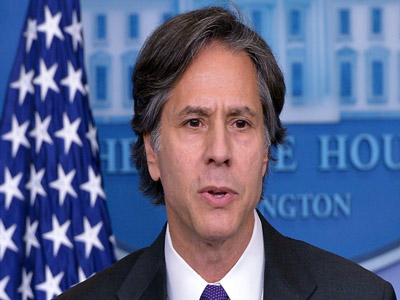
THE United States (U.S.) has pledged to support Nigeria tackle insecurity and corruption facing the country, adding that the U.S. can do this by discussing practical ways to strengthen security, which is threatened by Boko Haram’s horrific acts of terror and violence. He further stressed that U.S. could help Nigeria develop its economy, combat corruption and make government more effective and transparent.
Meanwhile, the Institute for Peace and Conflict Resolution (IPCR) in conjunction with United Peace Federation of Nigeria (UPFN) has reiterated the need to build peace mechanism around the country to tackle conflicts. In a statement in Abuja, Deputy Secretary of State, Anthony J. Blinken said that U.S. delegation’s presence in Nigeria this week was to help prepare for President Muhammadu Buhari’s visit to Washington on July 20.
He further said that the visit would also reflect the commitment of President Barack Obama and the U.S. to strengthening the partnership between America and Nigeria and to advance a more secure, prosperous and peaceful future for all of Nigeria’s citizens. “The partnership we are forging is based on mutual interests and mutual respect.
And it is grounded in the proposition that our relationship is defined not by what the U.S. can do for Nigeria, but rather what the U.S. can do with Nigeria. “Nigeria’s historic elections and peaceful transfer of power sent a powerful message to the region, to the continent and indeed to the world that leaders are accountable to their people.
We are proud to stand alongside the new government as it works to turn the promise of this moment into real progress for all the citizens of Nigeria.” Blinken noted that the U.S. strongly condemned the recent attacks that had taken hundreds of lives in some cases within the sanctuaries of churches and mosques and “our thoughts are with the families and friends of those who were murdered during this deeply painful time. “Defeating Boko Haram requires a comprehensive approach that involves the region and includes not only a strong military response, but also sustainable security for liberated areas, good governance, development, and opportunity for the civilian population.
“It also requires a strong commitment to human rights, the absence of which only alienates the people and drives them toward Boko Haram. As Nigeria develops this comprehensive approach, the United States will deepen our support.” According to him, as the government makes transparency and anti-corruption a priority, there is a vital and unique role for citizens and civil society to play in helping develop solutions to problems that government alone cannot.
He stated that they, together with other groups, community groups, NGOs, labour unions, charities, faith-based organisations, professional associations, and foundations drive innovation and spark new ideas that government can bring to a larger scale. “Indeed, we know that democracy is more much more than an election.
It is the hard, painstaking work every day to build accountable, transparent institutions, a vibrant civil society, open political space, and a strong commitment to the rule-of-law. “It requires those elected by the people to forge a government that reflects the values, advances the interests and protects the rights of all the citizens of the country.
The hard challenges of this moment are matched by its promise – when Nigeria can advance important security, economic and governance reforms that will help unlock its vast potential as a regional and indeed global leader,” he added.
The deputy secretary of state explained that they met with some governors noting that like the U.S., Nigeria has a strong federal system with enormous responsibility vested with governors and state governments.
“We discussed the challenges they face and the importance of their leadership in setting the entire nation on the right course. And there was a very interesting emphasis, besides security, on questions of education, health care, different industries like agriculture and building strong value chains along the entire line of production.”
They said that the move was one of the cardinal ways to promote reconciliation and co-operation beyond traditional boundaries of religion, race, ethnicity and nationality.
According to them, the phenomenon of conflict is evolving and dynamic adding that a strong mechanism would go along to nip conflicts in the bud around the country.
Speaking in Abuja yesterday at the Special Capacity Building Programme on Conflict Resolution and National Reconciliation for Ambassadors for Peace, the Director General, IPCR, Oshita .O. Oshita said that the institute was committed to building a peaceful environment devoid of conflicts in the country. According to him, the institute had early warning centres across the six geo-political zones in the country.
“The institute of peace has been doing a lot of work around advocacy work for peaceful conduct and it has been doing a lot of works for direct intervention in a conflict areas in parts of Nigeria,” he further stressed.



